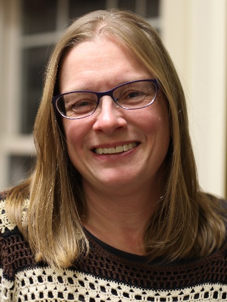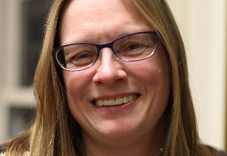Interview
What do you write?
Many years ago I wrote fiction that never left my desktop. Now I mostly write personal essay, mostly about family and politics, although I still sometimes fantasize about fiction.
Is there an author or artist who has most profoundly influenced your work?
When I was a kid, my parents had a copy of Nora Ephron’s Crazy Salad on the living room bookshelf. The subtitle was: Everything You Ever Wanted to Know About Linda Lovelace, Dorothy Parker, Breasts, Gloria Steinem, Bake-Offs, Feminine Hygiene, Sex Fantasies and Julie Nixon Eisenhower. So of course I devoured the whole thing. It was the first time I realized you could write politics and be funny at the same time. When I got to college I discovered Richard Russo’s The Risk Pool and Alice Walker’s Possessing the Secret of Joy, both of which had huge impact on me for years. Russo because he helped me realize you can write sad and be funny at the same time, and Walker because of the way she told politics through fiction, and the way she played with time and perspective.
Why did you choose Stonecoast?
The short answer is Penny Guisinger and Oren Stevens, two friends who graduated several years ago and got super swoony every time Stonecoast came up in conversation. So I thought I should check it out. Other factors: Being in Maine with Maine writers. A low residency schedule that (mostly) fits with work and parenting. The opportunity to explore other genres. Also, the social justice focus is important to me.
What is your favorite Stonecoast memory?
Oh, this is tough! Maybe when Indigo Moor and Deb Marquart read Russell Wilson’s hilarious script during the follies about two parents whose son was stuck in a YA novel. Or when Tyler Margid channeled the beat poets during his first open mic and brought the house down. Or really just any given moment during the residency when I suddenly realize, oh my gosh, I get to spend ten days talking about books and writing with all these smart, funny, talented people. It’s a total blast.
What do you hope to accomplish in the future?
Writing and teaching. Actually, with the help of a scholarship from The Office of Graduate Studies, I became certified this summer as an Amherst Writers & Artists group facilitator, and I’ll be running my first workshop next month. I’m busy selecting prompts for that first workshop and have landed on five poems, including two by Stonecoast faculty member Amanda Johnston.
If you could have written one book, story, or poem that already exists, which would you choose?
I think I have to go with Lorrie Moore’s Birds of America or Jenny Ofill’s Department of Speculation. Or maybe Abigail Thomas’s What Comes Next and How to Like It. Or Marion Winik’s Above Us Only Sky. Oh, and I just read Beth Ann Fennelly’s Heating & Cooling and totally wish I’d written that, too! It’s too hard to choose just one.
Featured Work
Word Search
The following is a work of non-fiction exclusively for Stonecoast Review.
We’re at the café, working on Mad Libs. I usually travel with some sort of game like this, Mad Libs, a deck of cards, or at least paper and pen for a game of Hang Man or Tic Tac Toe. When Isaac was younger, we played Mad Libs more often, but back then I’d still have to remind him sometimes what an adjective was, a noun, a verb. “Slimy!” he’d call out, or “poop!” Poop was a big one. Now he’s thirteen though, so when I say “adjective” he says “surreal.”
This is our first time at this café, where they serve you cups of three-dollar slow drip. We’re here with my brother, who’s just moved to this brick-lined city by the sea, an hour’s drive from our house up the coast. We’re not used to the hustle and bustle here, of cars not stopping in the crosswalk, of people in a rush. People are more stylish here, too, and generally not as plump.
When we first sat down with our coffees, we were still talking about Trump, so all the usual Trump related words were being bandied about: scary, idiot, buffoon, Canada. So now when I call out “plural noun” my brother says, “fascists.” More nouns follow. Eggplant, penguin, fungi.
“Is that Mad Libs?” asks a woman sitting next to us. She’s probably in her early thirties, she has a cute bob haircut and a knit hat, and she’s working on a crossword with two male friends who are also wearing knit hats. “Yes,” I say, “Wanna throw in a noun?” She’s thinking on it, a noun just forming on her lips, when her friend calls out, “Cheesecake!” I write it down. Now we’re getting pulled into their crossword, too. “Aero,” I offer when they are looking for a four-letter prefix for space. “Shiny,” they say when we need an adjective.
I forgot how much fun this is, this working on crosswords as a group. We used to hover over the dining table on Sunday afternoons with friends, just like this, coffee in one hand, pen in another, calling out answers, puzzling things together. My dad was always the superstar of these gatherings, the puzzle master, the word game pro.
He carried his puzzle book everywhere. The one he was working on when he died was the big yellow New York TimesOmnibus of 500 Sunday puzzles I gave him on his birthday in September. Twenty days later he was diagnosed. Cancer. Extensive. Small Cell. Seven months later he was dead. The whole time he was dying he kept joking that he was going to finish that book, he was going to get to puzzle 500 before he died.
Once, my aunt picked up the book, started working on one of the puzzles. “Stop!” he said, his blue eyes dancing, playing with the smile under his beard, “You’ll take a whole day off my life!” By the time April rolled around, he’d made it to puzzle 230. His last words to me were “18 across.”
“We never do puzzles anymore,” I say now to my brother.
“Well, yes,” he says.
We both know why that is, but it’s been almost two years now, maybe it’s time to start doing puzzles again, to start living in the world again, to get out from under this weight. I look over at these strangers, these nice people, who don’t know that we’ve lost our anchor, our mooring. They probably think we look just like regular people.
“Adjective,” I say to Isaac.
“Incorporeal,” he says.
“What? Do you even know what that means?” I ask him.
“Intangible,” he says. “Something you can’t touch, but you know is there.”

Andrea lives on the coast of Maine, where she works in non-profit development. She spends as much time as possible on the Damariscotta River with friends and family, including her teenage son. Andrea is a second semester student at Stonecoast. In 2016, her first published essay, “Breathe,” was nominated for a Pushcart Prize, named a Maine Literary Awards finalist, and named a Best American Essays notable essay.
